.
9.03.2015
Look! Up in the sky! It's a meteor, says 81-year-old WA farmer
‘Flash of light’ in a clear blue sky sends journalists and astronomy buffs rushing to find suspected meteorite
-
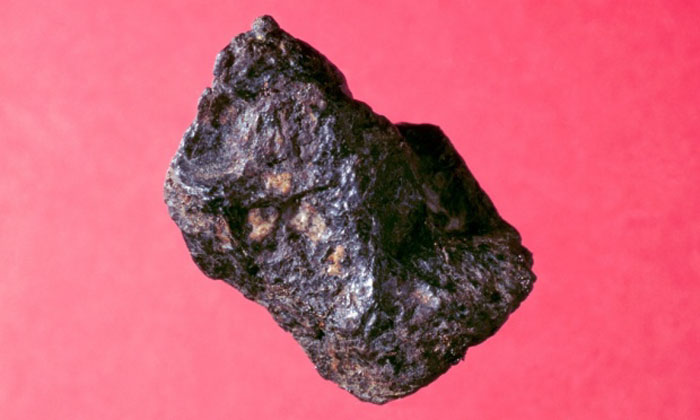
Geology professor Phil Bland says the meteorite would probably be cold, blackened and slightly brassy, not unlike this nickel iron meteorite in Arizona. Photograph: Leslie Garland Picture Library/Alamy
.
Journalists and astronomy buffs headed to a farm at Gidgegannup, 40km out of Perth in Western Australia, to search for a meteorite which a talkback radio caller says she saw fall over her property.
Angela Whife, 81, called ABC radio in Perth on Monday to say that she believed a meteor had winked out over her property mid-morning, and she was heading out to the paddock to have a look.
By 11am local time she had not found it. A number of Perth news crews went to help.
The suspected meteor streaked flashed across the sky in Perth about 9.30am.
A number of people called ABC radio and its rival, Fairfax Radio’s 6PR, to report seeing a “flash of light” in the otherwise clear blue sky.
That report was substantiated, on Twitter, by one of the local policing teams attached to Murdoch police station, in Perth’s southern suburbs. It appears from the tweet that one of the police officers saw the meteor. The other questioned their partner’s sanity and then suggested alien activity.
A truck driver identified as Trev shared with 6PR and Channel 9 what appears to be footage of a meteor falling that he took using his dashboard camera. The latter promised to broadcast the footage in full on its evening news bulletin.
Locals, Nine News Perth reports, are baffled.
A Curtin University geology professor and meteorite enthusiast, Phil Bland, has been collating reports of the “daytime fireball”.
Bland said the meteorite would have been “a big chunk of asteroid” to burn bright enough to be seen in daylight. He said it was probably about the size of a basketball when it entered the atmosphere.
The meteorite that is now on land – if it is on land and did not burn up in the atmosphere, which Bland says is also possible – is probably about the size of a grapefruit.
But Bland says it is unlikely that anyone actually saw it hit the ground, no matter what it may have looked like, because meteorites usually slowed from an entry speed of 20km a second to something closer to free-fall about 15km above the planet. That is not fast enough to burn.
“It’s the same as when you chuck a rock off a tall building,” he said. “Which would be painful if it hit, but it doesn’t leave a big hole.”
Bland said that in most cases where people report seeing a meteor hit, they are actually seeing it go over the horizon.
“It is very, very rare, it’s incredibly rare, that it’s a fireball all the way down to the surface,” he said.
“If that happened there would be a big crater on her property, like a 100m crater.”
Bland said the meteorite would be cold, blackened, slightly brassy and much heavier than an ordinary rock. It is more likely to be found by a farmer or a bushwalker some time in the future.
“That would be wonderful if they did,” Bland said. “There’s great scientific value when we record these things, particularly if you know where in the solar system it came from.”
He urged anyone who saw the meteorite to log the details in the Fire in the Sky app, which will allow his team to track its trajectory and potentially learn where in the solar system it came from.
“Give us a few days – the mathematics is very complicated,” he said.
Quelle: theguardian
.
Update: 10.3.2015
.
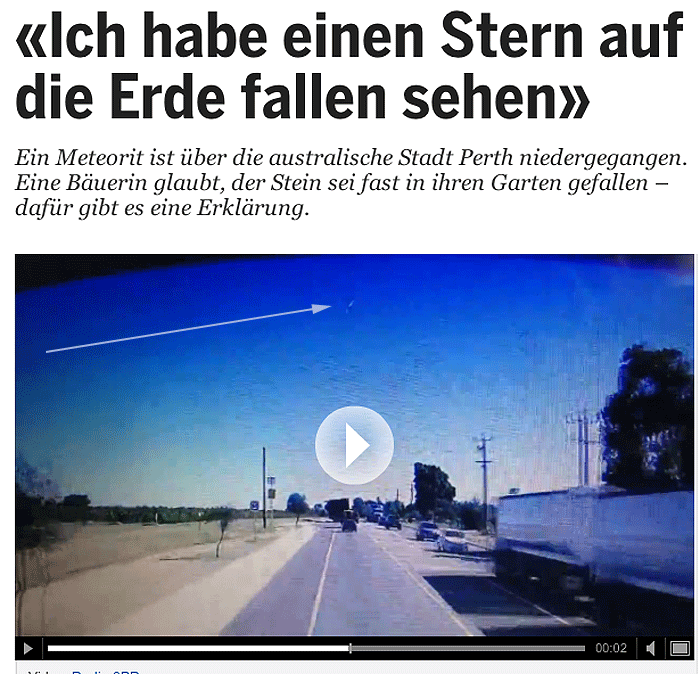
«Zuerst dachte ich, ich sehe eine Sternschnuppe», sagt die Bäuerin Angela Whife aus Gidgegannup in der Nähe von Perth zur australischen Newssite Perthnow.com. Dann sei ihr eingefallen, dass man Sternschnuppen am Tag eigentlich gar nicht sehen kann. «Trotzdem war da dieses runde, weiss leuchtende Ding mit dem Schweif am Himmel, das auf mich zukam.»
Immer weiter sei dieses «Ding» auf sie zugerast. Keine 20 Meter entfernt von ihr sei es in ihren Garten gefallen. Aber: «Ungefähr einen halben Meter über dem Boden ist das Leuchten plötzlich erloschen und das Ding war verschwunden.» Obwohl sie noch im Garten suchte, fand sie nichts.
«Ich habe einen Stern auf die Erde fallen sehen»
Angela Whife war nicht die einzige, die den Meteorit beobachtet hat. Aus der ganzen Region von Perth meldeten Menschen in den sozialen Medien, dass sie ein Leuchten am Himmel beobachtet hätten.
Jemima Hambling schreibt auf Twitter: «Ich habe gerade einen riesigen Stern gesehen, der auf die Erde gefallen ist – eigentlich war er sogar noch grösser als ein Stern.»
Ist der Meteorit in der Luft verbrannt?
Eine Erklärung für das Phänomen liefert Phil Bland, Professor für angewandte Geologie an der Curtin Universität. «Sehr wahrscheinlich war es ein Meteoritenblock, der da durch die Atmosphäre gerast ist», sagt er zu Perthnow.com. «Wenn er so gross war, dass die Leute ihn im am helllichten Tag gesehen haben, muss es sogar ein rechter Klumpen von einem Meteoriten gewesen sein.»
Auch die Aussage von Angela Whife, die den Stein in ihren Garten fallen sah, kann Bland erklären: «So ein Meteoriten-Feuerball brennt nur bis etwa 15 Kilometer über der Erde.» Das Licht, das ein Meteorit ausstrahle, sei aber so hell, dass sich der Feuerball viel näher anfühle, als er wirklich sei.
Zum «Guardian» sagte der Professor, dass eine Chance bestehe, dass der Meteorit in der Luft verbrannt sei. Trotzdem sei es möglich, dass der Meteorit auf der Erde gelandet sei. Bland zu Perthnow.com: «Obwohl das Leuchten hoch über dem Boden aufhört, ist noch immer ein Stück Fels da.» Wenn man bei solch einem Vorfall nahe genug sei, könne man sogar einen Überschall-Knall hören.
Gefunden hat den Stein aus dem Weltall noch niemand. Laut dem «Guardian» sind unzählige Teams mit der Meteoriten-Suche beschäftigt.
Ein Reporter der TV-Station «9News» hat den Einschlag mit der Dashcam seines Autos gefilmt.
.
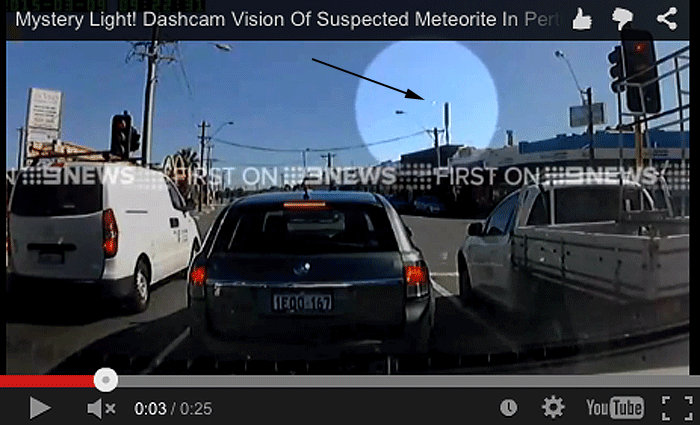
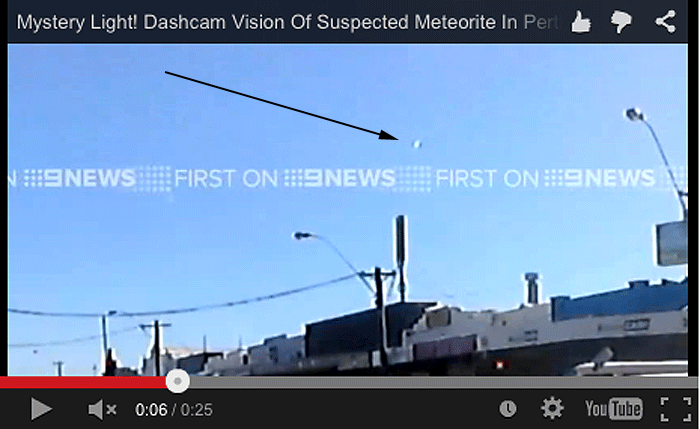
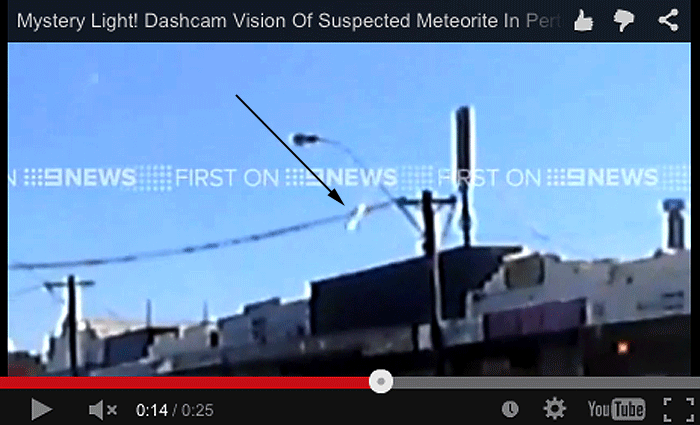
Sie schreibt: «Ich habe gerade einen riesigen Stern fallen gesehen – viel grösser als ein Stern sogar. Ich hoffe, es war kein fallender Satellit! Ich hoffe, alle in Perth sind okay!»
.
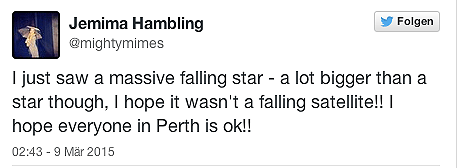
Quelle: 20min
4412 Views
